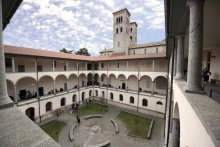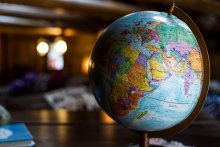The Dipartimento di Diritto, economia e culture – DiDEC pursues scientific purposes of a multi and inter-disciplinary nature thanks to the particularity of its training offer which, unique in Italy, allows to combine the studies in law with those of economic problems and those of interlinguistic and intercultural mediation, favoring mutual integration.
In particular, the Department aims to ensure, both in terms of research and in terms of training, the comparative and integrated study of social phenomena, analyzed in their normative, cultural and socio-economic meaning, as well as in the linguistic expression in which they manifest themselves, with specific attention to historical evolution and to the social contexts in which they are inserted.
The cooperation between different sectors has already produced appreciable positive results in the short life of this Department. In particular, it was possible to connect the study of multilingualism to the needs of economics and business and the study of coexistence and integration between different legal systems, cultures, languages and religions to that of the mechanisms for resolving conflicts and disputes, with attention to procedural, mediation-conciliation and reparative mechanisms.
The area addresses, from an interdisciplinary perspective, the issue of fundamental rights, in relation both to the debate about their foundation and protection in the frame of present globalized societies.
This area also focuses on the question of legal pluralism, characterized by the coexistence and competition among different (state and non-state) normative systems whose accommodation requires the experience of conciliatory and transformative methods. At this regard, the work of REDESM, CeSGReM and FEDAL research centres is particularly relevant.
It is in this context that the activity of the UNESCO Chair (www.uninsubria.it/cattedra-unesco) on the "Gender Equality and Women's rights in the multicultural society" takes place. The Chair aims to underline the paradigmatic role of women rights, at the centre of the debate on legal pluralism and the clash between different legal traditions.
Alessandro Ferrari
Elena Catalano
Stella Coglievina
Elisabetta D’Amico
Cristina Danusso
Giorgio Grasso
Valentina Jacometti
Sergio Lazzarini
Paolo Lepore
Gabriella Mangione
Grazia Mannozzi
Stefano Marcolini
Marco Migliorini
Chiara Perini
Cristina Reale
Adrian Renteria Diaz
Gilda Ripamonti
In the economic-legal area, particular importance is given to issues concerning the legal protection of environment, the enhancement of the territory and the implementation of qualitative and quantitative tools for the evaluation of current economic policies, particularly in times of crisis.
In this scenario, the departmental research in this area focuses on the close relationship between sustainability and environment understood both from naturalistic, cultural, economic and legal points of view.
Finally, particular attention is increasingly paid to the study of climate change and the development of appropriate legal instruments (at international, European and national levels) to develop suitable policies for mitigating the phenomenon, as well as for adapting the concerned territories. Particularly relevant, in this regard, the work of the POLAMB Research Center.
Barbara Pozzo
Maurizio Cafagno
Giorgio Grasso
Valentina Jacometti
Carmela Leone
Paolo Lepore
Chiara Perini
DiDEC is renowed for a tradition of studies on legal multilingualism, both from the point of view of legal translation within the European Union, and from the point of view of the interrelations and clash between different legal cultures. The activity of the Interuniversity Centre for Research in Comparative Law is carried out within this context.
Particular attention is also dedicated, in connection with the research on "Fundamental Rights", to the study of multiculturalism of religious matrix and of the relationships between state and confessional systems in the perspective of an increasingly pluralistic Mediterranean space. The contribution of the Research Centers, which are part of DiDEC (in particular REDESM), and the initiatives developed within the Course on Development Education (sponsored by UNICEF and the University) are also relevant in this area.
Francesca Ruggieri
Elena Catalano
Marta Cenini
Sebastiano Citroni
Valentina Jacometti
Geo Magri
Grazia Mannozzi
Stefano Marcolini
Marco Migliorini
Gilda Ripamonti
Silvia Marino
Paolo Bertoli
Maurizio Cafagno
Sebastiano Citroni
Elisabetta Codazzi
Stella Coglievina
Giuseppe Colangelo
Flavia Cortelezzi
Paolo Duvia
Maria Dominique Feola
Francesca Ferrari
Umberto Galmarini
Francesca Ghirga
Valentina Jacometti
Carmela Leone
Lucia Lopez
Gabriella Mangione
Marco Migliorini
Roberta Minazzi
Alessandro Motto
Andrea Morone
Alessandro Panno
Chiara Perini
Giuseppe Porro
Fabrizio Vismara





